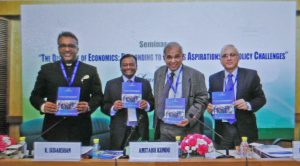O. P. Jindal Global University celebrated its eight anniversary with a round table discussion on Building World Class Universities on 30th September 2017.
The distinguished participants were Mr Kewal Kumar Sharma, IAS, Secretary, Ministry of Human Resource Development, Government of India, H.E. Ms Mariela Cruz Alvarez, Ambassador of the Republic of Costa Rica, Ms. Sun Meixing, Head of Education Affairs, Embassy of People’s Republic of China in India, Dr. Bertrand de Hartingh, Counsellor for Cooperation and Cultural Affairs, Embassy of France in India, Mr. Stephan Lanzinger, Counsellor and Head of Science & Technology Section, Embassy of Germany in India and Mr Frederick Hawkins, Vice Consul, Embassy of the United States of America, New Delhi.
The roundtable was organized to initiate a dialogue amongst international diplomats and guests towards understanding world class universities and rankings of that have created new opportunities for Indian universities to aspire towards seeking excellence.
The paradigm shift in the Indian higher education system is being promoted through efforts to create world class universities in both the public and the private sector among global university leaders about the key current challenges that national higher education systems around the world are confronted with.
Mr Kewal Kumar Sharma, IAS, Secretary, Ministry of Human Resource Development, Government of India, addressing the gathering spoke about the challenges and hurdles in Indian higher education system and how India is keen to create world class universities. He lauded the effort of private sector which has come on its own to set up “Universities like this one(JGU)”.
Mr. Sharma informed the gathering about Government recent proposal for private sector and public sector “to set up institution of global repute”, which he called, “institution of eminence”.
He further added, “There will be an empowered committee of experts, comprising of distinguished persons who would analyse these proposals on merit. We have already asked ten from private sector and ten from public sector institutions to come forward with their proposals”.
“Ranking, does remain kind of an aim and goal; but what is more important from education point of view, countries point of view is the quality of education is, what ought to be, both in terms of where we broadly headed, be it in terms of economic development education should lead us to become better human being”, Mr. Sharma added.
Founding Vice Chancellor, Professor(Dr) C. Raj Kumar said, “As we aspire to increase the quantity and raise the quality of higher education institutions in India, we need to draw from experiences around the world. There is a reason why there is not a single world-class university run on a for-profit basis. Public and private universities, which are top ranked in the world and are reputed for excellence in teaching, research and capacity-building, have all been not-for-profit institutions.”
He added, “The growth expansion and evolution of the Indian higher education sector today has indeed transformed our country in unimaginable ways. However, there is a conscious need based upon a sense of conviction and purpose to build institutions of global excellence at a level which can compete with international institutions.
Commenting on Costa Rica being a country without army, H.E. Ms Mariela Cruz Alvarez said, “Being defenceless is our best defense. The decision we took in 1948 reaffirmed our commitment to the higher principles of life. We embarked on the task to unlock the full potential of our citizens”.
Quoting from Bhagwat Gita, Ms Alvarez said that we as teachers our role is to ignite students’ mind with larger sense of purpose and focus. World class Universities needs to transmit that passion and focus in interactions with young minds. “A person who is awake, not in denial and ready to give the very best, one who is proactive, motivated, vulnerable, feel other people’s suffering, open minded and sensitive”, she added.
Dr. Bertrand de Hartingh, Counsellor for Cooperation and Cultural Affairs, Embassy of France was in the opinion that competing for ranking should not be the soul goal rather it should be “higher education for all”. He defined a World Class Universities to be “an open world university”, which receives students coming from all over the world.
Dr. Hartingh also stressed on the model of multi-lateral engagements of universities rather than only bi-lateral MoUs, where multiple universities come in agreement in a global platform.
Taking the discourse forward, Mr. Stephan Lanzinger, Counsellor and Head of Science & Technology Section, Embassy of Germany in India spoke about internationalisations, openness and autonomy of institutions. The role of higher education is to “provide a purpose and a vision”, he added.
Highlighting how the government under various projects strove to consistently improve the quality of education at all levels in China, Ms. Sun Meixing, Head of Education Affairs, Embassy of People’s Republic of China in India said, “In 1990’s the government under various projects aimed to improve the higher education institutions of the country, as part of the effort over 100 universities were selected for developing and enhancing the quality of higher education. The government allocated specific funds and resources to these institutions as major centers of research and excellence”
The Round Table noted that India faced particular challenges in terms of numbers, public versus private institutions and in terms of providing equitable access to education for all.
These objectives need to be dovetailed into the larger objective of having World Class Universities in India, the Round Table concluded.

